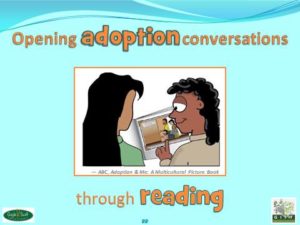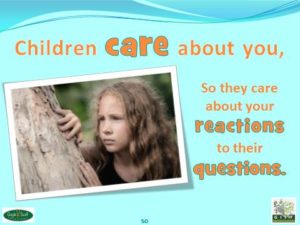 As Intentional parents, we understand the importance of having a well-stocked family adoption library. In last week’s blog we explored the top six benefits that it can serve. Of course, like most things connected to adoption, the reality is more complicated than one might first expect. Having an AQ library is an awesome first step, sends an important and affirming message of validation to our kids. Let’s consider five reasons 2. your family adoption library can’t handle everything.
As Intentional parents, we understand the importance of having a well-stocked family adoption library. In last week’s blog we explored the top six benefits that it can serve. Of course, like most things connected to adoption, the reality is more complicated than one might first expect. Having an AQ library is an awesome first step, sends an important and affirming message of validation to our kids. Let’s consider five reasons 2. your family adoption library can’t handle everything.
- Parents can’t fall into thinking children will turn to the books on their own. Parents must take a leadership role in selecting a book and suggesting that they read it together. I would be a mistake to believe that kids will think to turn to a book. Not only might it not cross their minds, they most likely will be unable to identify which book can best serve them at that particular moment. Parents familiar with the contents of each book will need to provide the appropriate direction.
Until somebody pulls the book off the shelf, it’s nothing more than a piece of décor filling a bookshelf. A book is only a good tool when it is read. Parents will want to introduce each book to their children by reading it together. This collaborative reading sends a message that the parent values the book and that is something that they want to spend their time reading with their child. (Parents will want to consider a child’s degree of interest. If he is reluctant, offer some genuine encouragement. However, if a child rejects it, honor their decision with an important caveat: make certain that they understand you think it is important to share the material together and commit to doing it another time. Then make sure that you try again in the future.
Do not mistakenly assume that a child is so comfortable with his adoption that he does not need to talk about it.[/ctt] Coming to term with his adoption is a life-long, complex process, one for which they truly need the guidance, empathy, and insight of parental guidance. Parents must overcome any personal discomfort or reluctance so they can skillfully lead their children through the emotional maze that adoption creates. In the absence of parental guidance and openness, kids must struggle on their own, with limited experience, understanding, and skills.

If a child consistently rejects the chance to read a book, explore their reluctance. What is spurring it? Does his reluctance reflect a general disinterest in reading?* Or does it only show up when it comes to reading about adoption? Perhaps he’s afraid, uncomfortable, or sad. Talk about these emotions. Ensure that he believes your willingness to read and talk about adoption is authentic. Most importantly, he must trust that his parents are capable of hearing all of his feelings on the subject, not just the happy and positive ones. A child must be absolutely convinced that his parents want to hear their truthful feelings, not just candy-coated ones. This is not a one-and-done message; they must hear this consistently over time. And parental actions must align with their words.
Many adult adoptees report that they frequently decided not to talk about difficult stuff out of fear of hurting their parents, of making their parents too sad, or out of fear of their parents’ anger. Kids must be convinced that the conversation is safe to share, that it will not endanger the parent/child relationship, and that they won’t be “punished” for expressing difficult thoughts. Some kids fear parents might hold a grudge or might use their words against them in future moments of parent/child conflict.
Many adult adoptees also say that they refrained from talking about their feelings with their parents because of fear that any negativity on their part might trigger rejection by their (adoptive) parents. After all, they reasoned, it happened once—they were relinquished by their birth parents—and they were unwilling to risk it again.

- Parents must be alert for the moment when it makes sense to open a book and read it—or part of it— together. It is through sharing the experience that connection occurs. Listening depends not only on hearing the words but also on assessing the child’s bodily responses. Are they tense and bottled up, sad and locked down, concerned and in need of assurance? Listen not only to the language spoken and the non-verbal body language but also to what is not being said, and what they avoid discussing. These factors offer profound insight into a child’s mind and heart.
- A book can only provide information; it can’t read between the lines. Books are simply the channel through which communication can be exchanged. [ctt template=”3″ link=”na8to” via=”yes” ]To truly hear their child and decipher what they need at a given moment in time, parents must be fully present[/ctt]—not just physically but also with their complete attention. Remember, [ctt template=”7″ link=”b9DBf” via=”yes” ]parental attention is the currency which kids most crave. They equate that with an affirmation of their value. When parents spend time listening to a child, she feels valued and affirmed. [/ctt]
- Books convey information but an attentive conversation between parent and child creates a space for discovery, deep understanding, the development of nuanced understanding, and the clarification of misunderstandings or distorted generalizations. Your conversation is deeply personal and tailored to a specific child/parent relationship. Books are a superlative tool but nothing can substitute for the love and attention of in-tune parents.
 How can you use your adoption-attuned library to benefit your child, increase your own Adoption-attunement, and to nurture an open and loving forum for family discussions?
How can you use your adoption-attuned library to benefit your child, increase your own Adoption-attunement, and to nurture an open and loving forum for family discussions?
How do you discover the best books for your family? What do you learn when you discuss these books with other adoptive parents?
*Ensure that any possible learning disabilities have been identified and take the appropriate interventions.
https://wp.me/p4r2GC-1YK



I so agree that it is so important to read books on adoption to your child and to be attuned to what and how they are feeling regarding this reading and topic. However, what if a child has trouble comprehending the written word? it has been my experience that if this is so, a parent needs to find other ways to communicate to a child the information regarding this important topic.
Yes, it is important to use a variety of channels to help open conversations about adoption. And, since reading forms the base of so much of school activity, be sure to research what factors contribute to a child’s resistance. Undiagnosed learning disabilities can have a very significant influence on a child’s academic success.
As I was reading this, I thought how great it would be to add to the cousins’ adoption family library as well! I can imagine that questions would come up and a story would be one way to address them. #adoption #adoptivefamilies #AAQ
That is a wonderful idea! All would benefit from deeper understanding!